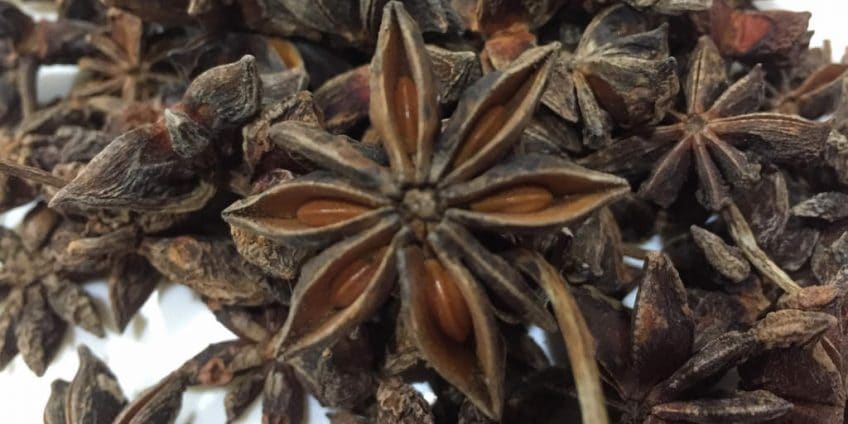Scroll to Recipes with Star Anise / चक्र फूल as ingredient
Star anise is the dried up fruit of Illicium Verum tree that is a native of Vietnam and Southeast China. Majorly, it’s production is in these two countries. Whereas, in India, Arunachal Pradesh produces it in a tiny quantity.
Anethole is a significant compound in star anise. It gives the spice its flavor and provides aroma in recipes. People also use this in baking, perfumery, and producing liquor.
It is also a drug antecedent. Star anise is considered a significant source for the shikimic chemical acid. Shikimic acid is a precursor to making a drug for anti-influenza and oseltamivir.
Commonly known as
Star Anise is widely known as badiyan in India.
| Language | Name | Written as |
|---|---|---|
| Arabic | alyansun | الينسون |
| Bengali | Tārakā anise | তারকা anise |
| Gujarati | Badiyan | બાદિયાન |
| Hindi | chakr phool, anasphal | चक्र फूल,अनासफल |
| Kannada | Sṭār sōmpu | ಸ್ಟಾರ್ ಸೋಂಪು |
| Malayalam | takkēālaṁ | തക്കോലം |
| Marathi | bādayāṇ | बादयाण |
| Tamil | Naṭcattira cōmpu, Anashuppu | நட்சத்திர சோம்பு, அனுஷப்பூ |
| Telugu | Anasapuvvu | అనసపువ్వు |
| Urdu | badiyan ka phool | بریانی کا پھول |
| Sanskrit | mishi | मिशी |
Nutritional Profile of Star Anise
Nutritional profile per 100 gms
- Calories: 337
- Protein: 18g
- Carbohydrate: 50g
- Fiber: 15g
- Fat: 16g
- Sodium: 16mg
- Potassium: 1.441mg
Source: USDA & Google
Though there is a lack of research based on the nutritional value of star anise. Still, some nutrients are known to be present in it. Specifically, carbs and calories are present in star anise. Also, star anise is fat-free and low on carbs too.
Benefits
Anti-Viral Capabilities
Star anise is a rich source of shikimic acid that has anti-viral capabilities. It is used as the main ingredient in the medication for influenza. Moreover, it is also found that the essential oil obtained from star anise can cure other viral infections like herpes. It is also an excellent medicine for viral flu.
Source: link.springer.com
Anti-Fungal
The oil in star anise that gives it the sweet and aromatic flavor is anethole. Research jas found that anethole possesses anti-fungal properties. Further research is still on to prove this point further.
Source: ncbi.nlm.nih.gov
Anti-Bacterial
According to some research, star anise extract is useful as anti-biotic. The bio-active compounds in star anise help treat urinary infections. Also, it helps reduce the growth of E.Coli bacteria.
Source: ncbi.nlm.nih.gov
Side Effects
It is safe for culinary use or consumption if taken in a small amount. Chinese star anise that is not being contaminated is entirely safe.
However, the Japanese counterpart of Chinese star anise is considered toxic by many. Japanese star anise reported having cause fatal physical symptoms like seizure, hallucination, and nausea.
Besides, many potential fatal reactions also are reported in infants.
Moreover, pregnant women are also not to use star anise.
Source: PubmedCentral
Frequently Asked Questions
How does star anise taste like?
Star Anise has intense flavors. It is sweet, earthy, nutty, and simultaneously spicy.
Are star anise and anise the same thing?
Star anise and anise are not the same things. They are from entirely different species of plants. Besides, star anise is much stronger in flavors and is also spicier. Anise has milder flavors compared to star anise.
Can I take both the pod as well as the seed for consumption?
Yes, you can use both the seeds and pods in cooking as a whole and also in ground form.
How long can star anise be useable?
Star anise can be used for two years as a whole. But if it is ground, then it can last up to 1 year. And that needs to be stored in a container properly.
What can be the substitute for star anise?
Anise is the best substitute for the star anise. But you need to use anise in a double amount to get the flavor correctly.
How to store star anise?
It is to be stored just like your other dry spices. You need to store it in an airtight container and keep it away from direct sunlight and heat.
What is star anise good for?
The oil we obtain from star anise is useful for treating cough and flu. It is also an anti-bacterial and anti-fungal property containing spice.
Source: PubmedCentral
Does star anise affect blood pressure?
Traditionally, in Chinese medicines, star anise was used to regulate blood pressure. The presence of nutrients like potassium, calcium in the spice extract helps to relax the blood vessel walls and thus reducing blood pressure.
Source: ncbi.nlm.nih.gov

